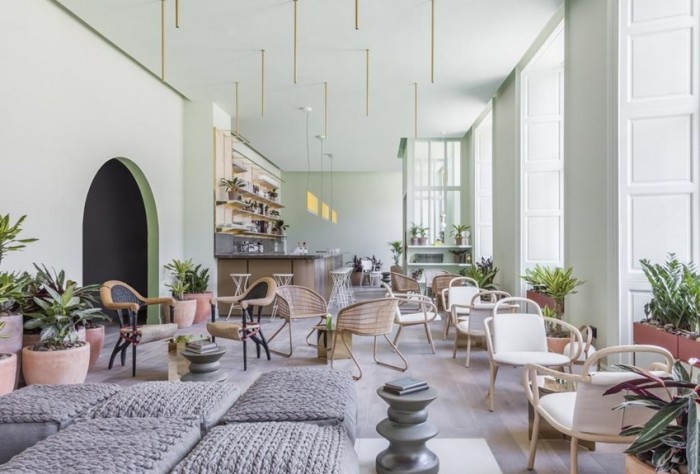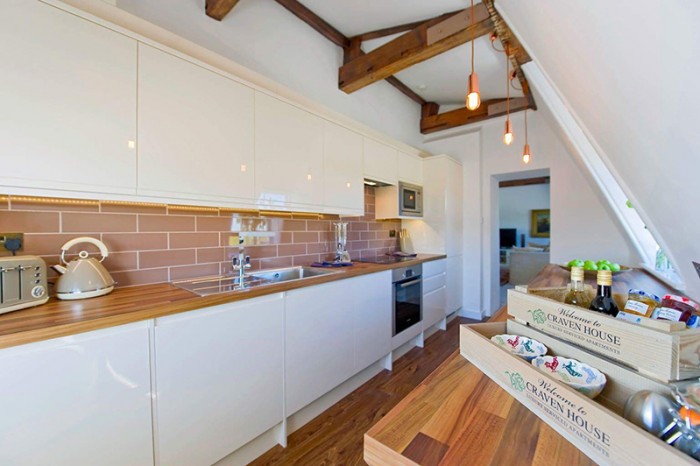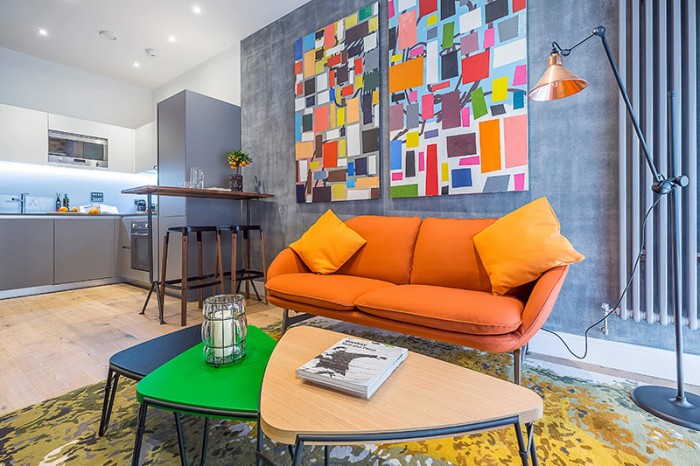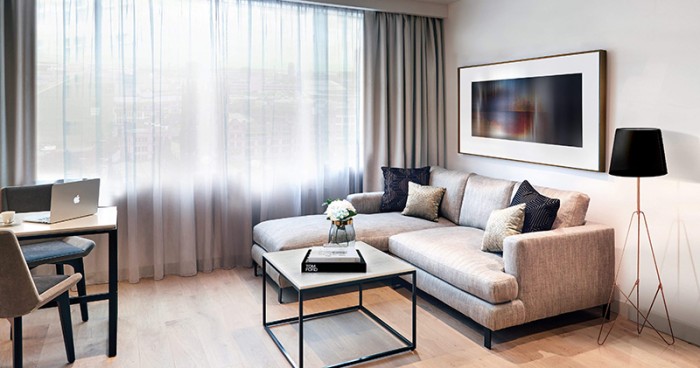At Your Service
Design Insider review the Serviced Apartment Sector
The serviced apartment sector is one of the fastest growing hospitality sectors around the world. In January this year, the world’s largest owner-operator, The Ascott Limited announced their expansion target to double their global portfolio from 80,000 to 160,000 units by 2023 (this follows on from a doubling from 40,000 units in 2015 to a predicted doubling to 80,000 units by the end of 2018).

We caught up with James Foice, Chief Executive of ASAP (Association of Serviced Apartment Providers) to understand what was happening in the UK market. “In the UK alone over 2,000 new serviced apartments are expected to open this year, representing a +9% increase on current supply. New openings planned are not just in London but right across the country from Edinburgh to Southampton which demonstrates the very considerable confidence in our sector and its significant ongoing growth potential”.
Up to now, this sector has largely been dominated by business travellers, however hotel brands are increasingly targeting shorter stay, leisure travellers with the aparthotel format to maximise occupancy. Whilst the business traveller is and will likely stay as the key revenue and profit generator, there’s no doubt that leisure travellers are better informed in accommodation choices and opting for this format of accommodation.
A hybrid of residential design and hospitality service, ASAP use the umbrella term of “serviced apartments” to cover this sector (serviced apartments, aparthotels, extended stay suites within hotel complex). “Consumers are really responding to this more flexible way to stay, whether they’re staying on business or leisure”, explains Foice.
George Sell, Editor of Serviced Apartment News helped define the three main types of accommodation formats in this sector:
- Serviced Apartments
- Aparthotels
- Extended Stay
Serviced Apartments
primarily targeted towards business travellers who are booking periods. Classic layout of living space, bedroom & kitchen area. The interior design tends to be quite neutral.
Aparthotels
contemporary smaller unit with communal areas for work and leisure time. A brand extension of traditional hospitality brands, where interior design plays a greater role in creating spaces which would appeal to business and leisure travellers. Millennials are a key target for this type of accommodation.
Extended Stay
extension of hotel brands, suite format to target business travellers. More leisure travellers / families becoming aware of this style of accommodation, which is often cheaper and a lot more flexible in terms of space than a traditional hotel room.
A recent survey by Serviced Apartment News amongst 5000+ readers revealed an optimism for serviced apartment sector. 63% of operators surveyed had taken on new units in 2017 and 79% planned to take on more in next 12 months. 47% of operators expect the proportion of leisure business to increase over next 12 months.

“Aparthotels represent smaller percentage of accommodation stock in UK compared to USA and Europe, therefore there is a huge opportunity for growth in this sector. We are seeing a lot of overseas private equity investment in this sector, particularly from USA”, explains Sell, quoting the US investment giant Brookfield as one example having recently exchanged contracts to buy SACO from Oaktree Capital Management for around £430 million.
“82% of operators polled by Serviced Apartment News listed Airbnb as having a positive effect on serviced apartment sector”
Fuelled by Airbnb, there is greater awareness on accommodation choice by leisure travellers, knowing they are no longer limited to hotels. 82% of operators polled by Serviced Apartment News listed Airbnb as having a positive effect on serviced apartment sector, with 55% listing accommodation on this and similar platforms – generally when there are gaps in bookings, as its still preferable to attract longer business stays. There is indication that some corporate business is also switching to aparthotels.

The sentiment survey of the UK sector undertaken by ASAP and Savills in November 2017 confirmed that more than 40% of operators are looking to accelerate their expansion plans in 2018. The driver of improved operational performance in 2017 appeared to be coming from the improved demand from the leisure segment with 70.6% of respondents stating this is up on last year compared to 56.8% in June. “Some of this demand may have been fuelled by Airbnb, which has been responsible in promoting unregulated accommodation – this is something ASAP are addressing through accreditation”, says Foice.
The rapidly expanding serviced apartment sector is largely unregulated in the UK, therefore brings challenges in delivering consistency of standards. This is where the ASAP come in, a the not for profit trade body representing 189 members, who collectively operate over 100,000 apartments in 19 countries. ASAP have a broad membership and represent all major brands operating within this sector in the UK, and work in partnership with CHPA in the US. ASAP accreditation is awarded on attaining set quality and due diligence standards, important to both operators and consumers.
Market growth is often fuelled by innovation, and this sector is proving be particularly innovative, responding and adapting quickly to changing consumer trends and introducing new models. ASAP share some recent examples:
Cycas Hospitality are expanding rapidly both in the UK and Europe. Their dual branded model is especially innovative, this summer they will open a double decker property in Manchester, as Staybridge Suites will have a Crown Plaza Hotel underneath.
Supercity Aparthotels new property in London, ‘The Chronicle’ incorporates 53 luxury apartments as well as 2 floors of state of the art offices, an onsite gastro pub and a gym.
SACO’s expansion of their Locke aparthotel brand will see them open in Manchester this year, the property there will include a co-working space, a gym, brasserie and a cocktail bar.
Similarly, Native’s new Manchester property will also include a co-working space, a brasserie, cocktail bar and fitness studio.

“Whilst there has been a significant rise in the number of aparthotel brands opening, ultimately an operator has to measure financial return on room occupancy, therefore whilst communal areas are a current trend their longevity is yet to be proven”, says Foice.
The annual Serviced Apartment Awards is establishing itself as a celebrate of excellence. Commenting on interior design, Sell said “there is a greater emphasis on interior design particularly in aparthotels to create welcoming communal areas. We see a mix of hospitality and residential interior designers working in this sector. Locke by SACO a good example creating work and living spaces.”
Many BCFA members already supply this fast-evolving sector, which is no longer sitting on the fringes but creating a space in mainstream hospitality. For more information, download the latest ASAP Fast Facts.





Comments